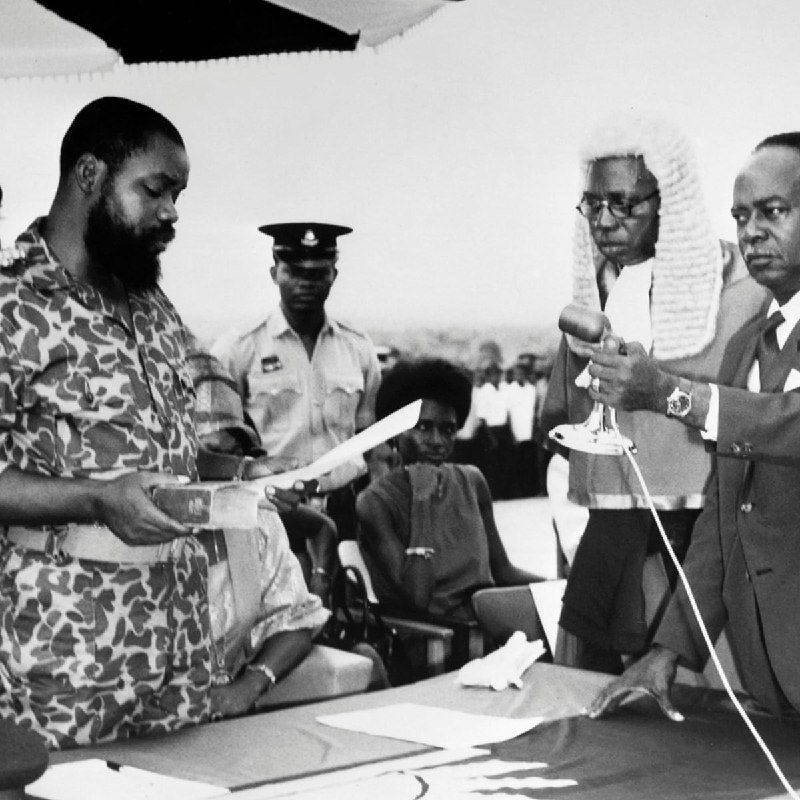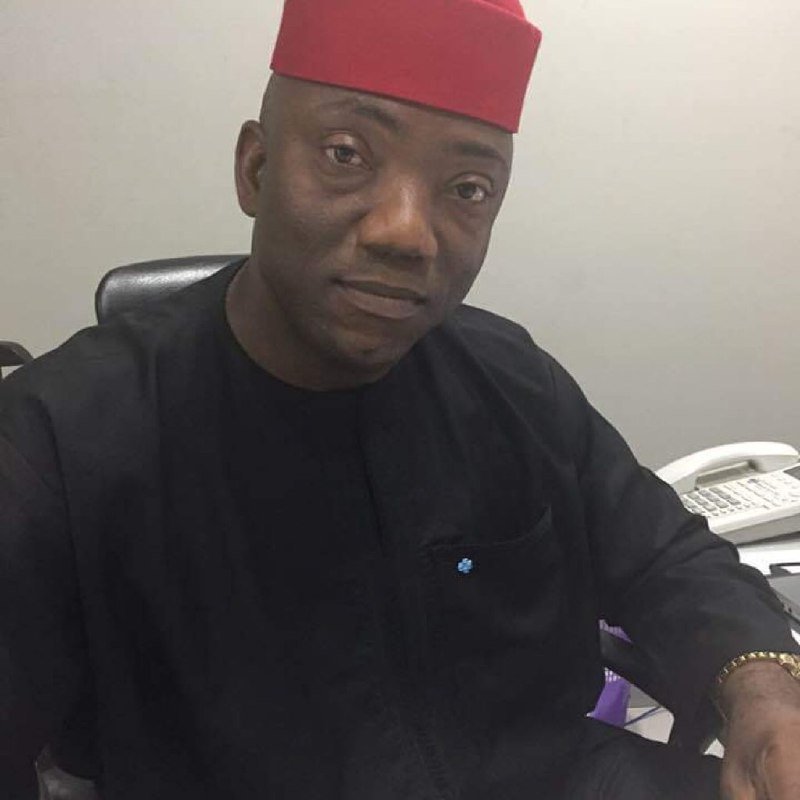By: Anayo M. Nwosu
By 1988, Chief Chukwuemeka Odumegwu-Ojukwu had been completely demystified by Umunwakanwa in Umudim Nnewi, his kinsmen few years after his heroic return from exile in 1982.
Ojukwu had stayed on exile in Ivory Coast following the defeat of Biafra he led until 1982 when President Shagari granted him amnesty and permission to return to Nigeria.

The Biafra Declaration By Ojukwu, And How The Civil War Ended
Still filled with the zeal to serve his people, Ojukwu decided to stand for election into Nigeria’s senate to represent Anambra state to the utter awe of the federal government who were not prepared to risk his early presence at the centre. The powers that be didn’t want him around the seat of government so soon.
The top leaders of National Party of Nigeria (NPN) didn’t want Ojukwu in the Nigerian Senate and had to rig the election in favour of little known Anambra
the state commissioner for health, Dr Edwin Onwudiwe of NPP even though NPN won the governorship position.
It was unbelievable and shocking that Ojukwu could lose an election anywhere in Igbo land but the federal government rigging machine made it possible despite the presence of a powerful Ojukwu militia named Ikemba Front made up of Igbo youths and a remnant of former Biafran soldiers who still felt young and some enthusiastic young men.
Few months down the line, Ojukwu’s efforts in retrieving his stolen senatorial mandate was rendered useless by Buhari military coup and sacking of the civilian government.
The iconic Ojukwu became more human by marrying a far younger woman in Bianca Onoh, a beautiful woman created early Sunday morning when God’s moulding materials were still fresh.
Bianca then was a beauty queen and a wife meant for only Ojukwu who was the most revered Igbo man living at that time. No other man was greater than Ojukwu in Igbo land until he died.
It then happened that a member of Ojukwu’s extended family or clan reported a certain matter or issue he had with Ojukwu to the family court of Ụmụnna.
Ojukwu’s family tried the matter and found Ojukwu guilty and pronounced him ostracized or excommunicated from the ụmụnna or extended family relationship.
Ostracism or excommunication is a severe punishment meted out to a family member who had refused to obey a summon for adjudication or blatantly refused to serve a punishment for an offence like paying a fine or tendering an apology to the offended.
An ostracized person is worse than a medieval Igbo outcast. No member of the extended family is expected to visit or deal with him and his family.
In the market square, the kinsmen of the ostracized would not buy or sell wares with him or her. He or she is also forbidden from going to a neighbour to borrow smoking charcoal or firewood to ignite fire for cooking or to borrow an axe to chop wood.
It is total isolation geared towards bending the will of the ostracized to comply or to submit to the magisterium of the extended family or Ụmụnna because it is believed that “Ụmụnna ka” or that “the extended family which is the first unit of government in Igbo land is supreme”.
Chief Emeka Odumegwu-Ojukwu was still ostracized up till 1988 when the then military government of Gen. Babangida decreed a Constituent Assembly to formulate and draft the 1989 Constitution.
The membership of the Assembly was to be determined by-elections.
Each tribe in Nigeria was expected to send their first eleven hence Ndigbo at home and diaspora beckoned on Ojukwu to go to Lagos, the then Nigeria’s capital to ensure that the interest of the Igbos were protected and he agreed.
But Prof. Eme Awa’s National Electoral Commission had insisted on a direct open voting system which was later called Option A4 by Prof. Eme Awa’s successor, Prof Humphrey Nwosu.
Under the voting system, the contestants must first win at their ward levels followed by local government levels then senatorial zonal levels and up till the state levels.
A candidate standing an election would stand and his supporters would stand be
hind him or his poster to be counted. The candidate with the highest number of votes was declared winner there and then.
The direct voting system later known as Option A4 was an antidote to election rigging in Nigeria.
But Chief Emeka Odumegwu Ojukwu had to cross the huddle of getting the support of his own ward which consisted of his extended family members that had ostracized him.
Applying the rules of the ostracism, nobody would vote for Ojukwu.
Therefore one popular Nnewi politician named Chief Ken Emechebe, alias Ebekuo Dike, saw an opportunity to win the election in the constituent assembly and he was sure of beating Ojukwu.
“After all, if Dr. Edwin Onwudiwe could do it in 1983, I can as well defeat Ikemba now”, Ebekue Dike assured himself.
The elders of Nnewi saw the Constituent Assembly election as a bug that had perched on top of the scrotum which must be handled with care.
The elders met and decided to firstly chase away the kite that had come to snatch away the chicks and later settle issues with the careless hen that had exposed the chicks to the kite. They would not allow a pregnant goat to deliver while tied to the tethers especially when they were aware that there was a dangerous snake that could kill Ndigbo’s interests hiding inside the roof.
Nnewi people would not want to be blamed for not releasing Ojukwu to fight for the interest of Igbos in the assembly of tribes of Nigeria.
The resolution at the elders meeting was disseminated through a town crier to the disbelief of Chief Ken Emechebe, Ojukwu’s opponent.
On the Election Day, candidate Ojukwu, the Ikemba Nnewi, stood in front and all the members of his Ward stood behind him.
Only Chief Ken Emechebe and his wife didn’t vote for Ojukwu. The wife voted for the husband.
Chief Emechebe, Ojukwu’s opponent, was surprised to see his brothers and other members of his own family behind Ojukwu.
The wife couldn’t do otherwise for obvious reason. She needed to stand by the father of her children.
Who says that Nnewi lack circumspection?
They don’t. Not after the 1967-70 Civil War. NdụNnewi act when they should. And when they do, they do it at a profit.
Post Disclaimer
The opinions, beliefs and viewpoints expressed by the author and forum participants on this website do not necessarily reflect the opinions, beliefs and viewpoints of Anaedo Online or official policies of the Anaedo Online.

